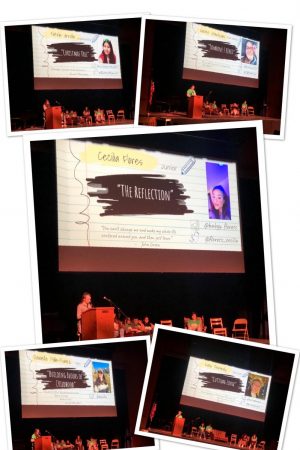A Voice for Others
Vocal Disability Leads to Compassion
March 8, 2015
At the end of the 1998 school year, Business Department Chairperson Dr. Fran Brady woke unable to speak. She thought she just had a cold. But over time, her voice did not return, so she went to her doctor. Her regular doctor was stumped but sent Dr. Brady to another physician. This doctor was Dr. Robert Bastian, who owns the Bastian Voice Institute in Downers Grove.
After many tests, Dr. Bastian informed Dr. Brady that she has a form of dystonia that affects her speech. Dystonia is is a movement disorder in which a person’s muscles contract uncontrollably. Dystonia can affect one muscle, a muscle group, or the entire body. Dystonia affects about 1% of the population, and women are more prone to it than men.
“There are a lot worse things in life,” explained Business Education department chairperson Dr. Fran Brady despite having a disability that some would think difficult in her line of work: teaching.
There have been moments of struggle. At first, she feared not being able to teach, so she studied to receive her cisco certified network associate (CCNA) certification. She was able to finish her doctorate, wrote a dissertation, and then was given multiple gongaduates to speak. After getting involved with school accreditation, she was asked to be the state chair. To be able to speak, she is injected with botox in her larynx which has given her the ability over the years to speak publicly and often.
But instead of feeling bad for herself, she’s used the experience to sympathize with others. Once, while shopping at Target with her daughter, Dr. Brady could not respond when the cashier asked her the price of a rug that was missing a tag. After multiple times asking, the cashier began yelling at Dr. Brady.
Moments like these have taught her to be humble and accepting. “I learned that when you see someone with a disability, sometimes people stare at them, and I realized that they know that people are staring at them. It’s like they don’t know about it. It’s like how someone misjudges because of something you can’t do. You learn to be more accepting.”
Dystonia has led Dr. Brady to other lessons as well. Google CEO Larry Page, when he lost his ability to speak, realized how poor he was at listening. Dr. Brady said, “I have to say that I find it to be true as well because when you listen to what people say, you can think like wow, if they would just be quiet, listen, and hear what people are really saying, they might be able to think a little bit more and come up with better ideas.”
Dr. Brady also spoke about Brody Robal, who won the Olympic Gold medal. She said when people see a kid like Brody, who has done such successful things in his life with far more difficult circumstances than hers, you think, “Stop complaining.”
For Dr. Brady, she realized that her accepting attitude and willingness to work through complications has worked. As the cashier yelled at her in Target, her daughter spoke up. “She can hear you,” she told the cashier. “She just can’t talk.” Dr. Brady said the moment made her realized that her daughter was making the same conclusions about disabilities as she did.







